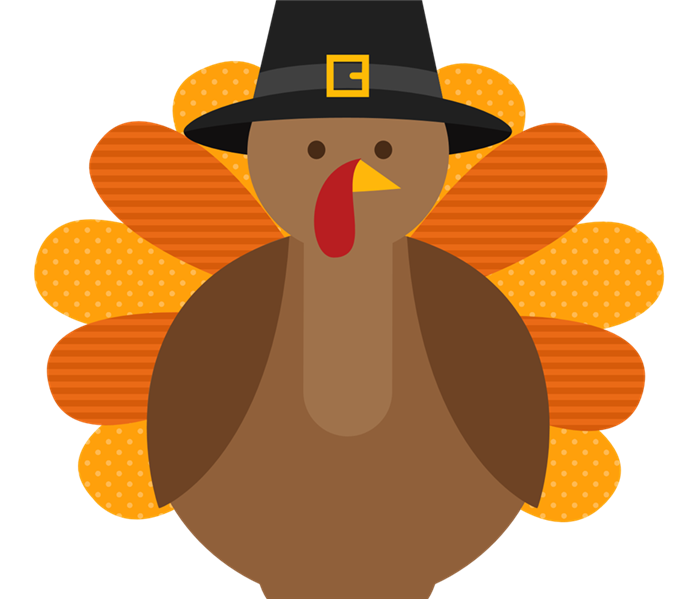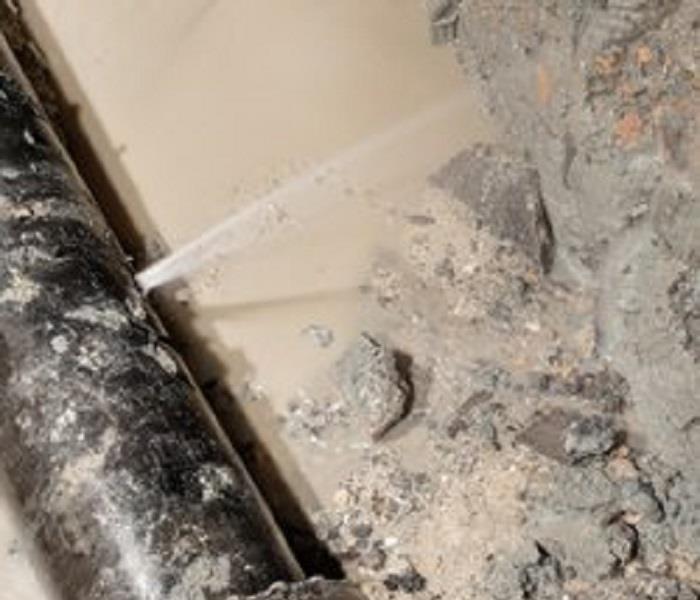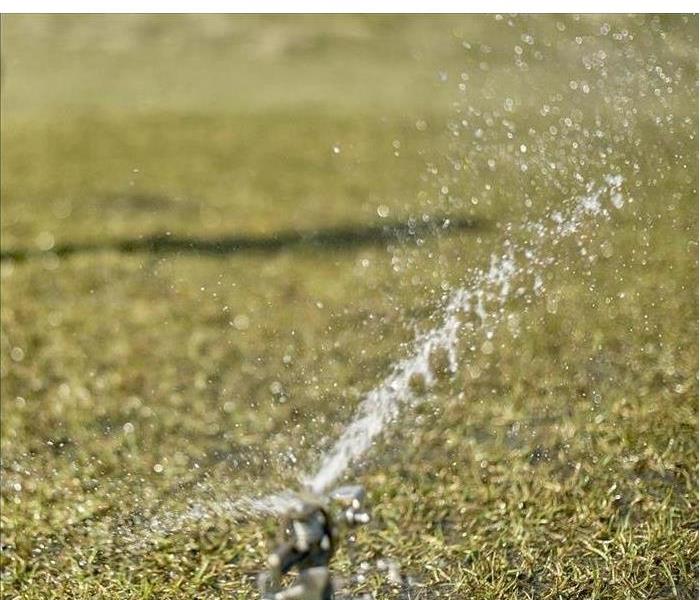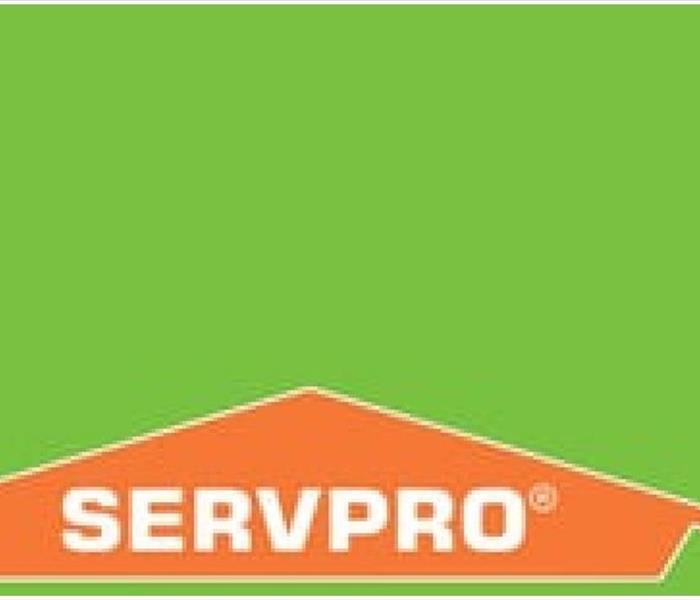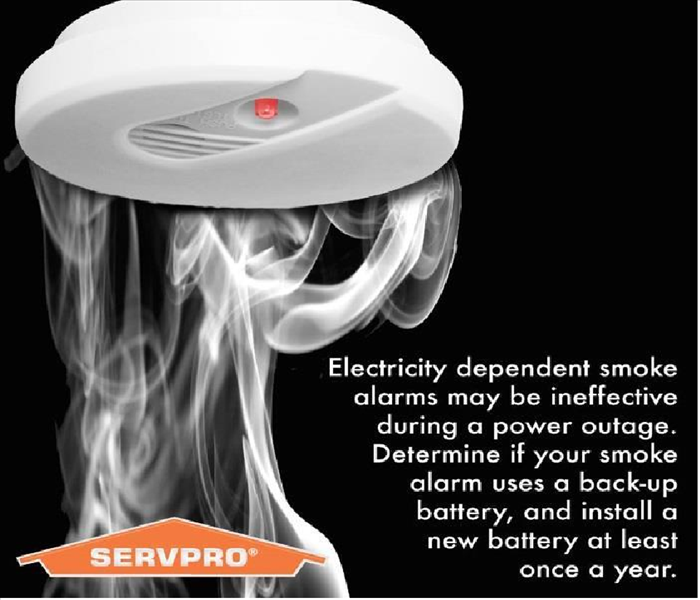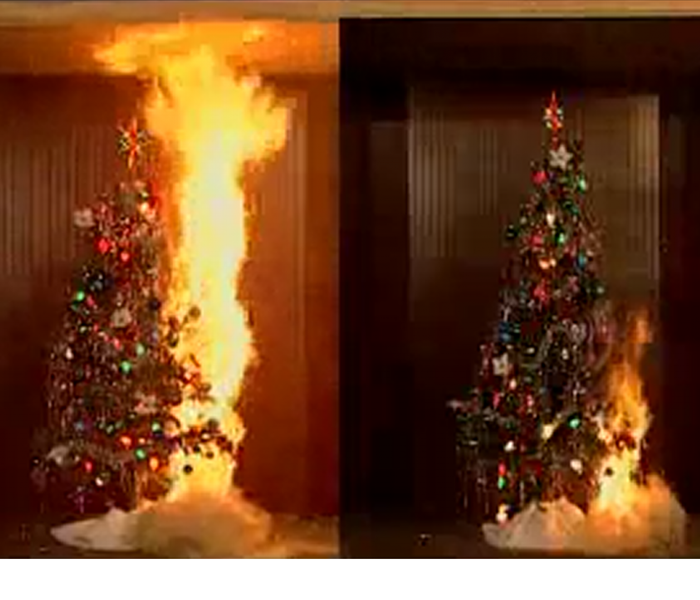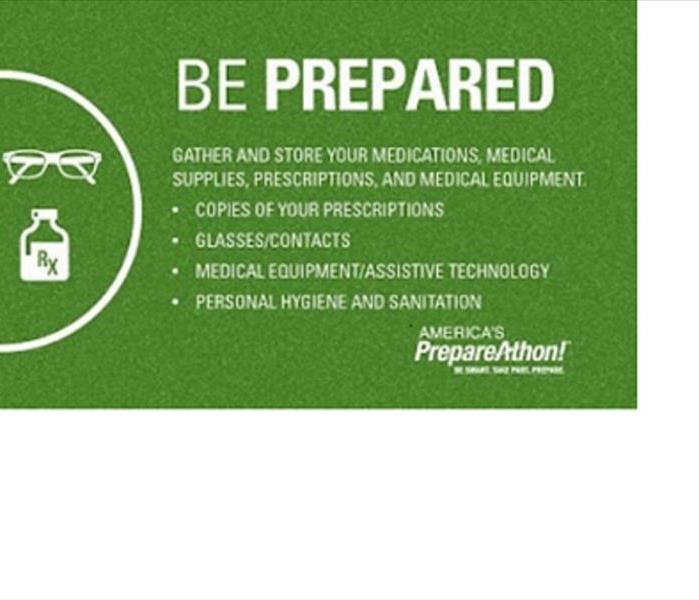Recent Community Posts
It Feels Like Summer
5/3/2021 (Permalink)
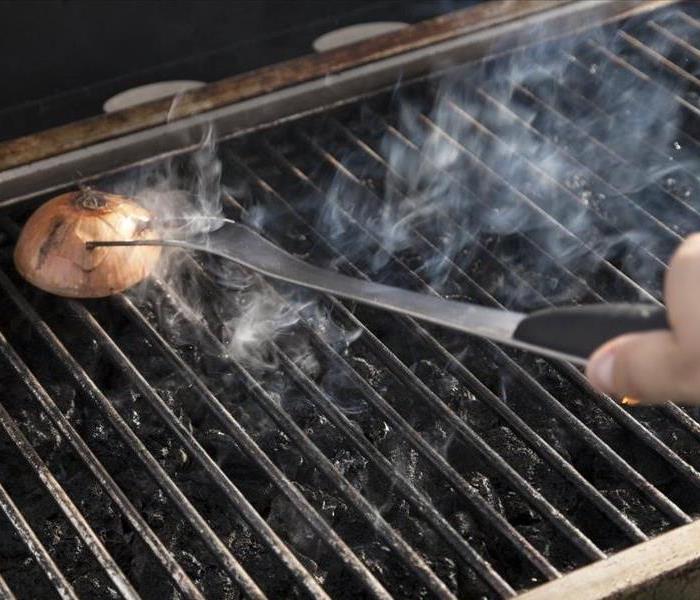 Cleaning a BBQ grill with a half onion to disinfect and get rid of the built up grime.
Cleaning a BBQ grill with a half onion to disinfect and get rid of the built up grime.
With spring coming to an end sooner rather than later, and the warmer days and the pandemic coming to end. We find ourselves spending more time outdoors, with friends and family.
Who else enjoys throwing weekend BBQ's with friends and family? I know we do! Nothing beats spending a nice sunny spring weekend with hamburgers and hot dogs on the grill surrounded by a good time.
Here's a super cheap, non-toxic alternative to keeping your grill in Ready mode for the next last minute BBQ.
Save your back and your Brillo pads by using an onion! yes, an ordinary already in your kitchen onion. Simply scrub a halved onion faced downwards on a heated grill to remove built up grime. It's best to get the grill super hot first to burn off any remaining food. Next, rub it hard with an onion stuck on the end of a long grilling fork (careful not to burn your fingers!). For extra gunk-fighting power, spray lemon juice or white vinegar first. The extra acidity helps with the cleaning process.
You'll thank us later!
Enjoy BBQ season from your friends at SERVPRO of Hacienda Heights/Rowland Heights!
Childcare/Daycare Proactive Cleaning
5/8/2020 (Permalink)
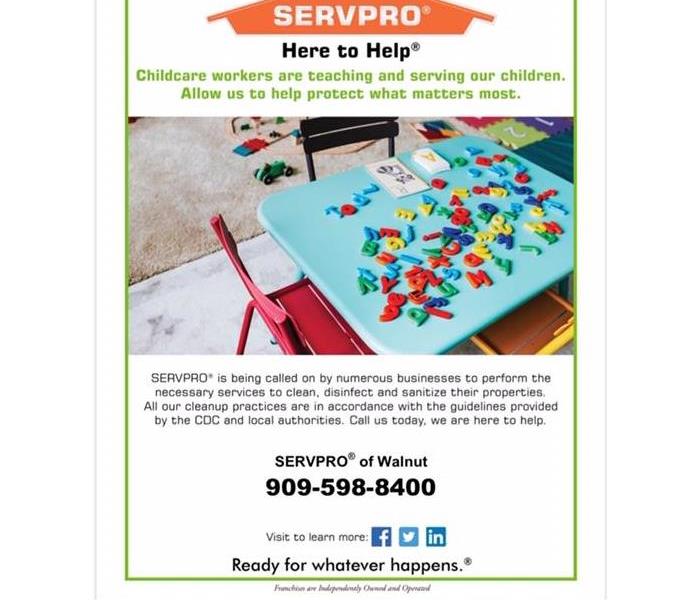 childcare/daycare facility cleaning flyer
childcare/daycare facility cleaning flyer
We are here to help Daycares & Childcare Facilities with proactive cleaning upon returning to "normal" operations. Give us a call to schedule you next appointment 909-598-8400
Thanksgiving Day Safety Tips!
11/23/2017 (Permalink)
Happy Thanksgiving! It is always good to be safe around the holidays and The American Red Cross has some fantastic tips for the family to travel and cook safe during this wonderful holiday.
Travel Safety- If plans include driving, travelers should check the weather along their route and plan for travel around any storms that may be coming. Everyone should use their seat belts and no one should drink and drive. Drivers should be well rested, alert and give their full attention to the road. Other driving tips include:
- Follow the rules of the road- observe the speed limit.
- Use caution in work zones.
- Make frequent stops. During long trips, rotate drivers.
- Don't follow another vehicle too closely.
- Clean your headlights, taillights, signal lights and windows to help you see, especially at night.
- Turn your headlights on as dusk approaches, or if you are using your windshield wipers due to inclement weather.
Cooking Safety- Cooks should avoid wearing loose clothing or dangling sleeves while preparing the holiday meal. Never leave the stove unattended-If the cook has to leave the kitchen for a short time, they should turn off the stove. More cooking safety steps are:
- Check food regularly.
- Use a timer as a reminder that the stove and oven is on.
- Keep children and pets away from the cooking area.
- Keep anything that can catch fire- pot holders, oven mitts, wooden utensils, paper or plastic bags, food packaging and towels or curtains- away from the stove, oven or any other appliance in the kitchen that generates heat.
- Clean cooking surfaces on a regular basis to prevent grease buildup.
- Consider purchasing a fire extinguisher to keep in the kitchen.
- Always check the kitchen before going to bed or leaving the home to make sure all stoves, ovens, and small appliances are turned off.
All of us here at SERVPRO of Hacienda Heights and Rowland Heights wish everyone a happy and healthy Thanksgiving!
Thanksgiving Pet Safety
11/20/2017 (Permalink)
Thanksgiving is just around the corner and the AVMA (American Veterinary Medical Association) has some great pet safety tips for you and your family to use during this joyous holiday.
Poison Risks:
- Keep the feast on the table- Eating turkey or turkey skin sometimes even a small amount can cause a threatening condition in pets known as pancreatitis. Fatty foods are hard for animals to digest, and many foods that are healthy for people are poisonous to pets like onions, raisins and grapes.
- No pie or other desserts for your pooch- Chocolate can be harmful for pets, even though many dogs find it tempting and will sniff it out and eat it. The artificial sweetener called xylitol (commonly used in gum and sugar-free baked goods) also can be deadly if consumed by dogs or cats.
- Yeast dough can cause problems for pets- Including painful gas and potentially dangerous bloating.
- Put the trash away where your pets can't find it- A turkey carcass sitting out on the carving table, or left in a trash container that is open or easily opened, could be deadly to your family pet. Dispose of turkey carcasses and bones in a covered, tightly secured trash bag placed in a closed trash container outdoors.
- Be careful with decorative plants- Don't forget that some flowers and festive plants can be toxic to pets. These include Amaryllis, Baby's breath, Sweet William, some ferns, Hydrangeas and more. The ASPCA offers lists of plants that are toxic to both dogs and cats, nut the safest route is simply to keep your pets away from all plants and table decorations.
For more essential information you can visit the AVMA and ASPCA website.
Some Halloween Safety Tips
10/25/2017 (Permalink)
Halloween is just around the corner and is definitely an exciting time for the kids and family. Here are some safety tips from AAP (American Academy of Pediatrics) that your family can use to have a safe and fun filled Halloween.
All Dressed up:
- Plan costumes that are bright and reflective. Make sure that shoes fit well and that costumes are short enough to prevent tripping, entanglement or contact with flame.
- Consider adding reflective tape or striping to costumes and trick-or-treat bags for greater visibility.
- Because masks can limit or block eyesight, consider non-toxic makeup and decorative hats as safer alternatives. Hats should fit properly to prevent them from sliding over eyes. Makeup should be tested ahead of time on a small patch of skin to ensure there are no unpleasant surprises in the big day.
- When shopping for costumes, wigs and accessories look for and purchase those with a label clearly indicating they are flame resistant.
- If a sword, cane, or stick is a part of your child's costume, make sure it is not sharp or long. A child may be easily hurt by these accessories if he stumbles or trips.
Carving a Niche:
- Small children should never carve pumpkins. Children can draw a face with markers. Then parents can do the carving.
- Consider using a flashlight or glow stick instead of a candle to light your pumpkin. If you do use a candle, a votive candle is safest.
- Candlelit pumpkins should be placed on a sturdy table, away from curtains and other flammable objects, and not on a porch or any path where visitors may pass close by. They should never be left unattended.
Home Safe Home:
- To keep homes safe for visiting trick-or-treaters, parents should remove from the porch and front yard anything a child could trip over such as garden hoses, toys, bikes and lawn decorations.
On the Trick-or-Treat trail:
- A parent or responsible adult should always accompany young children on their neighborhood rounds.
- Obtain flashlights with fresh batteries for all children and their escorts.
- Only go to homes with a porch light on and never enter a home or car for a treat.
The Top 5 Causes of Water Damage and How to Prevent Them
5/2/2017 (Permalink)
Here are the Top 5 household items that cause water damage to your home.
- Plumbing Supply: A failure to our supply system has the ability to cost you about $5,000 after your insurance deductible, dependent on your insurance company. Indicators of such a problem include an increase in your monthly water bill, banging pipes, rust stains, moisture in the walls or the floors, and signs of wet soil erosion near the foundation. You can take steps to avoid such a problem by ensuring that your pipes will not freeze during the cold winter months. To keep your pipes from freezing in the cold, set your thermostat at 60 degrees, let your faucets drip to get the water out of your pipes, and insulate your pipes to keep them warm. Additionally, you can install a house leak detection system that will alert you that there is a leak in your household.
- Toilet: One of the most common source of water damage is a toilet failure and one-third of toilet failures are caused by overflowing or clogged toilet. After taking out the deductible water damage due to toilet failures typically cost more than $5,500, dependent on the insurance company. To avoid a toilet failure in your home, wait until the valve had finished refilling the tank and bowl after flushing. If it looks as tough an overflow might be coming, turn off the supply valve to avoid the water spilling out. Another way to prevent the toilet failure is to inspect your toilet's components twice a year. This inspection should include the supply valve, the flush valve, and the supply line. While you're at it, you might want to consider upgrading your toilets supply line to a sturdier steel hose.
- Water Heater: Most water heater failures are caused by slow leak or a sudden burst in the tank. The next common cause of water heater damage is due to the supply line. Checking the life expectancy and warranty for your water heater will tell you whether or not you need to replace your water heater. To increase the life expectancy and delay replacing your water heater, perform proper maintenance. This includes flushing sediments and inspecting your heater's anode rod. Inspecting the water heater's valves will ensure that they are all in proper working order. Whenever possible, you should use ball valves instead of gate valves which will improve it's working condition.
- Plumbing Drain: Sewer backups are at fault for more than half of plumbing system failures with the majority of these issues occurring in the southern states. Problems with the plumbing drain system run at average cost of $4,000 per incident after the insurance deductible. With that type of the cost per incident, homeowners will want to do what they can to prevent such an event. The easiest way to prevent these problems is by refraining from pouring grease down the drain. Another way you can prevent sewer problems is by installing a back-flow prevention assembly for the home's sewer system if the home's sewer system is connected to the cities system. This is generally a problem for older homes. If you are considering planting trees, doing so away from lateral drain lines will ensure that the roots do not end up damaging any piping.
- Washing Machines: Washing machine hose failures are at fault for more than half of the claims that the IBHS study had recorded. The average cost to the homeowner after their insurance deductible came to $5,300 per incident. The reason why these incidents are so troublesome is that a burst inlet hose can cause an entire laundry room to flood in just a matter of minutes. To avoid this occurring, it's recommended that you replace the rubber hoses every three years. If you want to go a step further, you can replace the rubber hoses with braided steel hoses. Other tips include turning off the and cold water supply valve when you leave the house and not overloading the machine.
If a Blackout occurs are you prepared?
4/27/2017 (Permalink)
Watch this video which has great tips on how you can prepare and what you should have in occurrence of a Blackout. https://www.youtube.com/watch?v=dsURejjnYaM
The American Red Cross gives the following tips for During and After a Blackout:
During:
-Staying Safe Indoors
- Use flash lights in the dark, not candles
- Eliminate unnecessary travel, especially by car. Traffic lights will be out and roads will be congested.
- If you are using a generator be sure you understand the risks of carbon monoxide poisoning and how to use generators safely.
-Food Safety
- Keep refrigerator and freezer doors closed as much as possible. An unopened refrigerator will keep foods cold for about 4 hours. A full freezer will keep the temperature for about 48 hours (24 hours if it is half full) if the door remains closed.
- First use perishable food from the refrigerator. Perishables should have a temperature of 40 degrees Fahrenheit (4 degrees Celsius) or below to be safe to eat. Then use food from the freezer.
-Electrical Equipment
- Turn off and unplug all unnecessary electrical equipment, including sensitive electronics.
- Turn off or disconnect any appliances (like stoves), equipment or electronics you were using when the power went out. When power comes back on, surges or spikes can damage equipment.
After:
-Throw Out Unsafe Food
- Throw away any food (particularly meat, poultry, fish, eggs and leftovers) that has been exposed to temperatures higher than 40 F (4 C) for 2 hours or more, or that has an unusual odor, color or texture. When in doubt, throw it out!
- Never taste food or rely on appearance or odor to determine it's safety. Some Foods may look and smell fine, but if they have been at room temperature too long, bacteria causing food-borne illnesses can start growing quickly. Some types of bacteria produce toxins that cannot be destroyed by cooking.
Spring Sprinkler Information to Know!
4/19/2017 (Permalink)
Now that spring is on it's way, You've likely started watering your grass again with an underground irrigation system. This is a great tool for handling the mundane task of preventing your grass from drying from not enough hydration. Unfortunately not all good things come without a price. It's time for some ways you can prevent your sprinkler system from having any future problems or future leaks.
- What is a low head drainage
This is when the sprinkler continues to siphon water once the system has been turned off. This typically occurs at one of the lowest points in your yard as water drains down to that water spout. According to experts at sprinkler warehouse. "If a sprinkler head is located in the lowest part of the system, water will flow out of that head until an equilibrium has been reached or all of the water has emptied out of the zones pipes". When this happens, puddles start to form and or water flows across walkways and driveways. This an be prevented by a few adjustments being made t your system or the installation of drain check valve.
- How does a broke pipe occur?
A broken pipe can occur in the main line or lateral line of an irrigation system. In the main line, there is continuous pressure. So if there is a break or leak in this pipe, then water is continuing to run. Unfortunately, this can cause erosion or a wet spot. Attention needs to be made to this problem immediately so that the water line can be completely turned off for repair.
-A lateral line reaches different zones in your yard and are under pressure when the system is running. It can be hard to detect a leak because it's only visible when the system is on and you have to notice which zone actually has the leak. Regardless of it's location, it too can cause erosion or holes in your lawn. If you notice a leak in your irrigation system, it can be fixed and should be addressed fairly quickly.
This information can help you be aware of any possible leaks.
A Twist of Science In the Drying Process
2/26/2017 (Permalink)
Did you know there is actually a science behind the process of drying? Having the knowledge of psychometric's is essential to restoring a water damaged structure t its preloss condition.
While your initial reaction may be to grab a few towels to mop u the mess and place a fan or two around the damaged area. The team at SERVPRO of walnut is trained in the science of drying and follow strict industry-approved standards to help lower the chances of any secondary damages. If our business or home suffers a water damage, SERVPRO of walnut will:
- Inspect the building to detect every component that is wet, to help prevent secondary damage from happening.
- Measure how much moisture is in we materials and monitor whether the materials are during properly.
- Speed up mother nature by using professional drying equipment.
What exactly does it mean to help "speed up mother nature"? a wet building can often dry naturally because the environment always seeks equilibrium. When materials are wet, moisture will naturally move to drier. The only problem is, nature takes to long and secondary damages may occur while the building is drying out.
SERVPRO of Walnut has the tools and equipment to help mother nature along, including equipment to help dry hardwood floors, tough-to-reach spaces inside walls, and much more. We also use state-of-the-art monitoring equipment, and a proven scientific process to help speed the drying of your home or business.
Importance of Smoke Alarms
1/4/2017 (Permalink)
Smoke alarms play a vital role in saving lives, and when properly installed, can reduce the risk of fire injury in half.
The National Fire Protection Association recommends smoke alarms be installed in every bedroom, outside all sleeping quarters and on every level of the house. Business owners should consult the local Fire Marshall to ensure specific building fire codes and smoke detector requirements are met.
Smoke alarms work best when paired with a fire escape plan. A plan allows your family , employees or clients to escape quickly and safely in an emergency situation.
Review the following tips regarding smoke detector installation and maintenance. For more on emergency preparedness.
- Install smoke alarms on every level of the home, including the basement.
- Smoke alarms should be installed away from the kitchen to prevent false alarms. Generally, they should be at least 10 feet from a cooking appliance.
- Replace batteries in all smoke alarms at least once a year. If an alarm "chirps", the battery is low and should be replaced right away.
- Replace all smoke alarms when they are 10 years old.
Be Safe this Holiday Season
12/29/2016 (Permalink)
Pretty lights, candles and decorations are just a few of the items bringing charm and cheer to the holiday season, BUT if they are not used correctly this holiday season could go from festive to frightening.
The American Red Cross offers the following safety tips to help reduce the risk of a fire in your home or business this holiday Season.
- Place Christmas trees, candles and other holiday decorations at least three feet away from heat sources like fireplaces, portable heaters, radiators, heat vents and candles.
- Make sure that light strings and other holiday decorations are in good condition. Do not use anything with frayed electrical cords and always follow the manufacturer's instructions.
- Always unplug tree and holiday lights before leaving the property or go to bed.
- Never use lit candles to decorate a tree. Always extinguish candles before leaving the room or going to bed.
- Use only sturdy tree stands designed not to tip over. Keep curious pets and children away from Christmas trees.
- Keep anything that can catch on fire (Pot holders, oven mitts, wooden utensils, paper or plastic bags, food packaging, and towels or curtains) away from your stove top.
- Designate one person to walk around your property to ensure all candles and smoking materials are properly extinguished after guests leave.
How to prepare for an earthquake
10/4/2016 (Permalink)
Being that Earthquakes are common in California it is good to be Prepared.
Tips:
- Prepare a earthquake readiness plan.
- If necessary contact a professional to make your home sturdier.
- Make sure to locate a secure room in the house that you can go to in case of an earthquake. it should be a spot where nothing is likely to fall on you.
- Keep a supply of canned food, an up-to-date first aid kit, 3 gallons of water per person, Dust masks and goggles, and a working battery-operated radio and flashlights.
- Turn off the gas and water in home in occurrence of an earthquake.
In the Instance of an Earthquake:
- Take cover under a desk or table and hold on
- Stay indoors until the shaking stops and you're sure it is safe.
- Stay away from bookcases or furniture that is not secure and can fall on you.
For more information visit: http://www.environment.nationalgeographic.com
Here Comes Santa!
12/3/2015 (Permalink)
 Here Comes Santa 2015
Here Comes Santa 2015
Happy Holidays!
SERVPRO of Walnut / Hacienda Heights & Rowland Heights will be donating dozens of toys for children of all ages at the Annual Here Comes Santa event for the community of Rowland Heights.
Join us on Thursday, December 17th from 6:00 - 8:00pm at Rowland Heights Park!
2014 Walnut Family Festival
10/6/2014 (Permalink)
 34th Annual Walnut Family Festival
34th Annual Walnut Family Festival
Join SERVPRO of Walnut at the 38th Annual Walnut Family Festival this Saturday, October 11th, 2014!
The festival with kick-off with a pancake breakfast at 8:00am, then a parade down La Puente Road at 10:00am. Live music, entertainment and delicious food will be provided the rest of the day until 6:00pm. Don't forget to stop by SERVPRO of Walnut's booth while you are there!
Is Your Business Ready When Disaster Strikes?
9/10/2014 (Permalink)
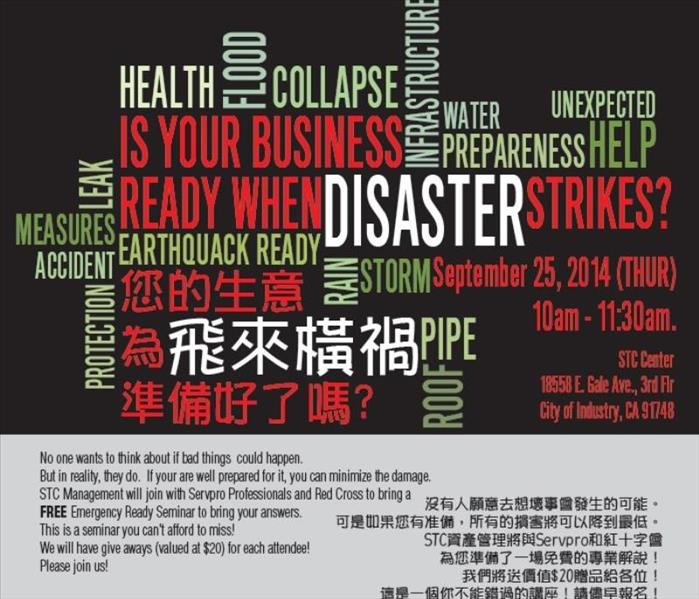 Emergency Preparedness Seminar
Emergency Preparedness Seminar
September is National Preparedness Month!
No one want to think about if bad could happen. But in reality they do. If your are well prepared for it, you can minimize the damage. STC Management will join with SERVPRO Professionals and Red Cross to bring a Emergency Ready Seminar to bring your answers. This is a seminar you can't afford to miss! Please join us!
When:
Thursday, September 25, 2014 from 10:00am - 11:30am.
Where:
18558 E. Gale Ave. 3rd Floor, City of Industry, CA 91748
RSVP HERE!
Questions?
Contact Nicole with SERVPRO at (626) 833-0774
or STC Management (562) 695-1513 x117
2014 Community Emergency Preparedness Fair
6/23/2014 (Permalink)
 The SERVPRO Disaster Recovery Trailer a the Emergency Preparedness Fair in Rowland Heights
The SERVPRO Disaster Recovery Trailer a the Emergency Preparedness Fair in Rowland Heights
SERVPRO of Walnut / Hacienda Heights & Rowland Heights participated in our Community Emergency Preparedness Fair on Saturday, June 21st 2014 at Schabarum Park in Rowland Heights.
The American Red Cross, Supervisor Don Knabe (4th District), local fire departments and local law enforcement came together to provide critical information to help individuals and families prepare for emergencies.
Jacob Menchaca spoke to the attendees at the fair about restoration, cleanup, how to reduce and prevent damages to your home, and emergency preparedness.
Walnut-Diamond Bar Sheriffs Booster Club ANNUAL GOLF CLASSIC
12/5/2013 (Permalink)
 ANNUAL GOLF CLASSIC Brochure
ANNUAL GOLF CLASSIC Brochure
Join SERVPRO of Walnut / Hacienda Heights & Rowland Heights at the..
Walnut-Diamond Bar Sheriff's Booster Club
ANNUAL GOLD CLASSIC
When? APRIL 7,2014
Where? Western Hills Country Club in Chino Hills
Contact Sgt Mark Saldecke (909) 595-2264 or Gil Rivera (909) 967-4525 for more information!




 24/7 Emergency Service
24/7 Emergency Service


